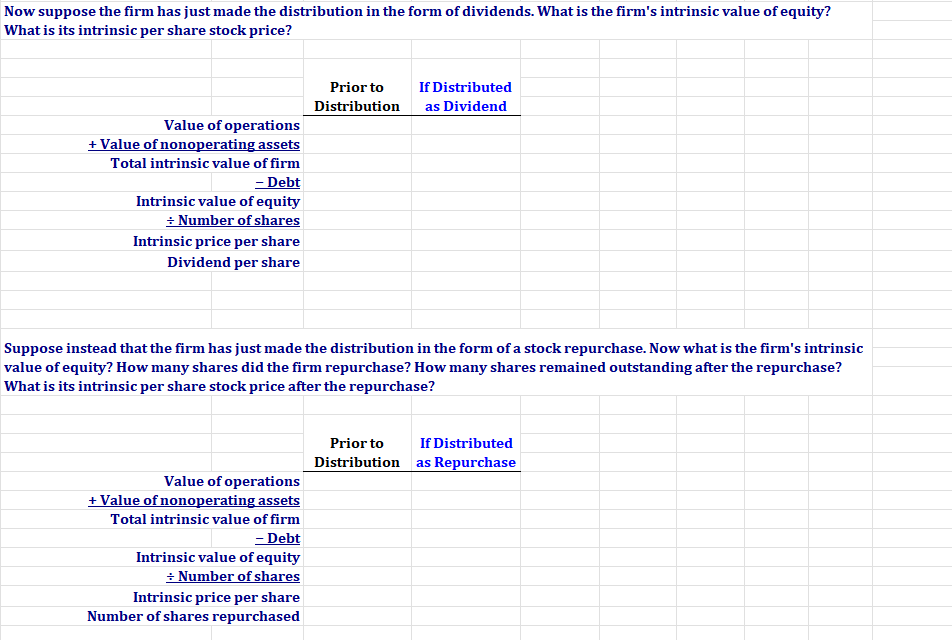Chapter14: Capital Structure Management In Practice
Section: Chapter Questions
Problem 12P
Related questions
Question
Dividend Policy. How is it possible that dividends are so important, but at the same time, dividend policy is irrelevant? If increases in dividends tend to be followed by (immediate) increases in share prices, how can it be said that dividend policy is irrelevant?

Transcribed Image Text:Consider a firm whose net income for the current year is $195 million, their target equity ratio is 75%, and the
expected capital budget is $135 million. What are its distributions to be made to shareholders, according to the
residual model? The firm has 80 million shares. Assume for now that the distribution is in the form of a dividend.
What is the forecasted dividend payout ratio? What is the forecasted dividend per share.
Net Income
Target equity ratio
Total capital budget
Total Dividends $
Payout Ratio
What if the expected capital budget rose to $155 million?
Total capital budget
Total Dividends $
Payout Ratio
=
Suppose the firm has decided to distribute the amount you first calculated above, which it presently is holding in
very liquid short-term investments. The firm's value of operations is estimated to be about $1,525 million. The firm
has $381.25 million in debt (it has no preferred stock). As mentioned previously the firm has 80 million shares of
stock outstanding.
Assume the firm has not yet made the distribution. What is the firm's intrinsic value of equity? What is its intrinsic per share
stock price?
Inputs
Value of operations
Short-term investments
Debt
Number of shares
Value of operations
+ Value of nonoperating assets
Total intrinsic value of firm
- Debt
Intrinsic value of equity
÷ Number of shares
Intrinsic price per share
Prior to
Distrib
ution

Transcribed Image Text:Now suppose the firm has just made the distribution in the form of dividends. What is the firm's intrinsic value of equity?
What is its intrinsic per share stock price?
Value of operations
+ Value of nonoperating assets
Total intrinsic value of firm
- Debt
Intrinsic value of equity
÷ Number of shares
Intrinsic price per share
Dividend per share
Prior to
Distribution
Value of operations
+ Value of nonoperating assets
Total intrinsic value of firm
- Debt
Intrinsic value of equity
+ Number of shares
Intrinsic price per share
Number of shares repurchased
Suppose instead that the firm has just made the distribution in the form of a stock repurchase. Now what is the firm's intrinsic
value of equity? How many shares did the firm repurchase? How many shares remained outstanding after the repurchase?
What is its intrinsic per share stock price after the repurchase?
If Distributed
as Dividend
Prior to
Distribution
If Distributed
as Repurchase
Expert Solution
This question has been solved!
Explore an expertly crafted, step-by-step solution for a thorough understanding of key concepts.
Step by step
Solved in 3 steps with 6 images

Knowledge Booster
Learn more about
Need a deep-dive on the concept behind this application? Look no further. Learn more about this topic, finance and related others by exploring similar questions and additional content below.Recommended textbooks for you

EBK CONTEMPORARY FINANCIAL MANAGEMENT
Finance
ISBN:
9781337514835
Author:
MOYER
Publisher:
CENGAGE LEARNING - CONSIGNMENT

Intermediate Financial Management (MindTap Course…
Finance
ISBN:
9781337395083
Author:
Eugene F. Brigham, Phillip R. Daves
Publisher:
Cengage Learning


EBK CONTEMPORARY FINANCIAL MANAGEMENT
Finance
ISBN:
9781337514835
Author:
MOYER
Publisher:
CENGAGE LEARNING - CONSIGNMENT

Intermediate Financial Management (MindTap Course…
Finance
ISBN:
9781337395083
Author:
Eugene F. Brigham, Phillip R. Daves
Publisher:
Cengage Learning

